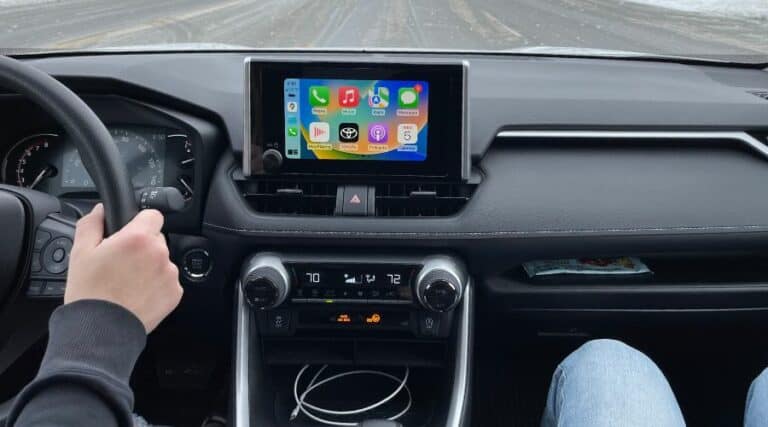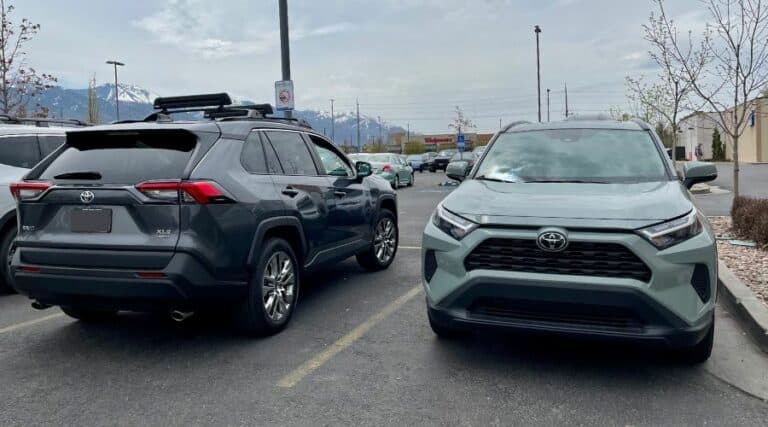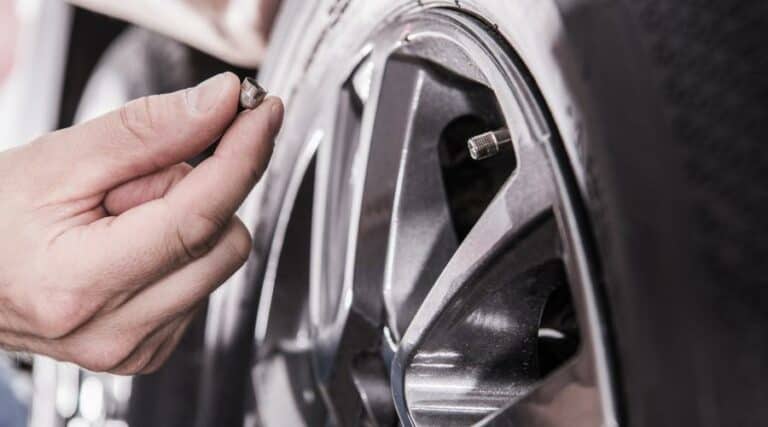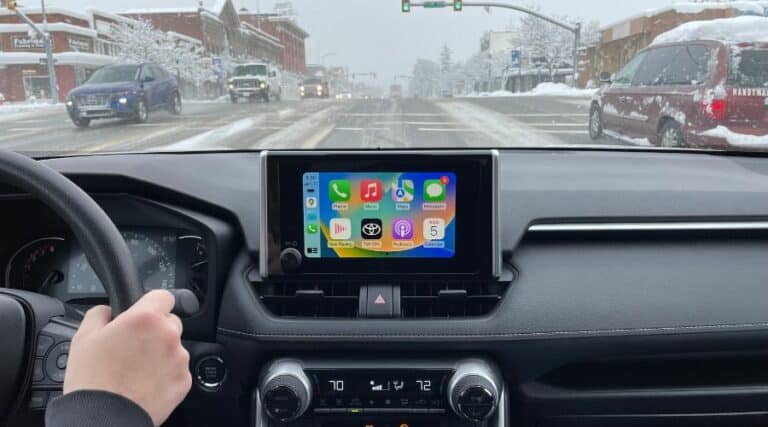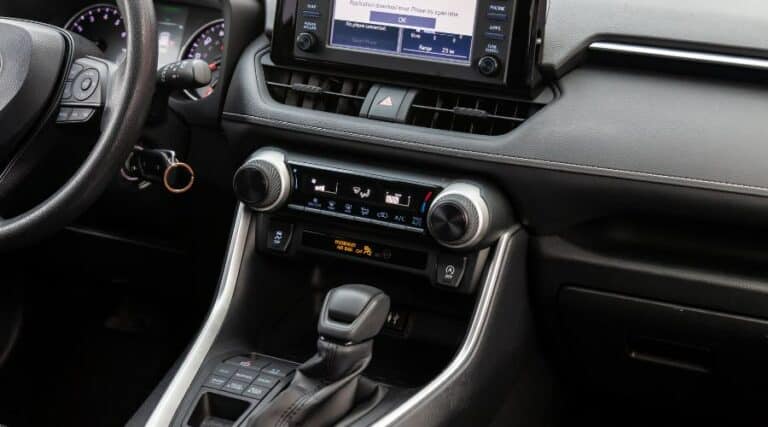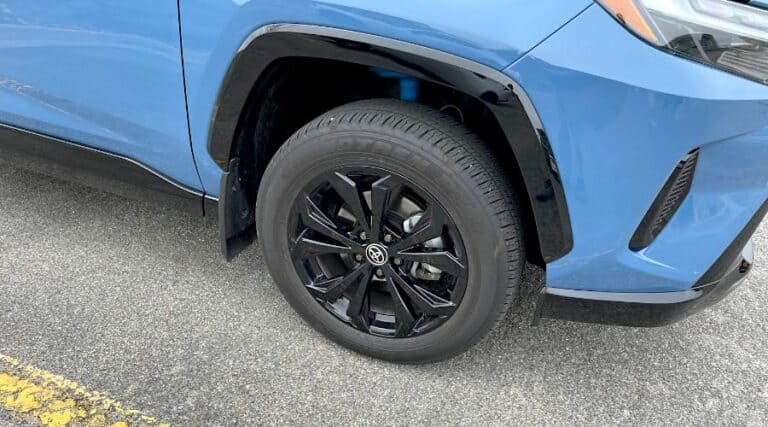Which is More Reliable, Honda CR-V or Toyota RAV4? Face-off
Is the Honda CR-V or Toyota RAV4 more reliable? We will compare the reliability of these two popular compact SUVs. As the top choices for families and adventure seekers alike, these two rivals are known for their exceptional performance and practicality. But which one reigns supreme when it comes to reliability?
According to the well-known J.D. Power rankings, the newest Toyota RAV4 is more reliable than the CR-V. The RAV4 scored an 82 out of 100 on their reliability score while the CR-V scored an 81.
However, let us look a little deeper! We’ve meticulously researched and compared the following aspects to provide you with an easy-to-read and comprehensive guide.
Table of Contents
- Key Differences between RAV4 and CR-V (fuel efficiency, design, and technology)
- J.D. Power reliability ratings (authoritative industry insights)
- Repair Pal data (real-world repair and maintenance costs)
- Expert and Mechanic Opinions (honest advice from the pros)
- Everyday Driver Reviews (feedback from people just like you)
- Recall History and Reliability Issues (how manufacturers learn and improve)
- Hybrid and Electric Variants (how they impact reliability)
- Honda CR-V Advantage (what makes the CR-V stand out)
- Toyota RAV4 Advantage (what sets the RAV4 apart)
- Frequently Asked Questions (FAQs)
My mission is to help you make an informed decision that fits your needs and preferences. So, sit back, relax, and let’s dive into the world of Honda CR-V and Toyota RAV4 reliability!
Is the Toyota RAV4 a good family Car? See 9 compelling reasons why the Toyota RAV4 is a good family car.
Key Differences Between RAV4 and CR-V
Let’s quickly explore some key differences between the Honda CR-V and Toyota RAV4. By understanding their distinct features, you can better gauge which SUV aligns with your lifestyle and preferences.
We’ve highlighted three important factors:
- Performance and fuel efficiency
- Interior design and comfort
- Technology and connectivity
Performance and Fuel Efficiency
The heart of any vehicle lies in its performance. Both the CR-V and RAV4 offer an engaging driving experience, but they also have unique strengths.
Honda CR-V
- Smooth and responsive power delivery
- Turbocharged engine in most trims
- Impressive fuel efficiency (28 mpg city/34 mpg highway)
Toyota RAV4
- Peppy acceleration
- Dynamic handling
- Competitive fuel efficiency (27 mpg city/35 mpg highway)
Interior Design and Comfort
The inside of your vehicle is very important when it comes to long road trips or daily commutes.
Honda CR-V
- Spacious and comfortable cabin
- Generous legroom and headroom
- Ample cargo space (39.2 cubic feet with rear seats up)
Toyota RAV4
- Rugged yet modern interior design
- Easy-to-clean materials
- Slightly smaller cargo space (37.6 cubic feet with rear seats up)
Technology and Connectivity
Staying connected on the go has become more important than ever. Both SUVs have user-friendly infotainment systems, but have a couple of differences.
Honda CR-V
- Available 7-inch touchscreen display
- Apple CarPlay and Android Auto compatibility
- Optional wireless phone charger
Toyota RAV4
- Standard 8-inch touchscreen (10.5-inch display optional)
- Apple CarPlay, Android Auto, and Amazon Alexa compatibility
- Available Wi-Fi hotspot
- Gauge cluster has a 7-inch digital display standard and a 12.3-inch display optional
Are you interested in wireless Apple CarPlay or Andriod Auto? See our article Toyota RAV4 Apple Carplay: How to Add Wireless CarPlay or if you have an Andriod phone then see our RAV4 Andriod Auto wireless guide.
Understanding the key differences between the Honda CR-V and Toyota RAV4 will help you and I dive deeper into the world of reliability.
J.D. Power Reliability Ratings for RAV4 and CR-V
As an authoritative source for evaluating vehicle reliability, J.D. Power provides insights you can trust. Let’s see how the Honda CR-V and Toyota RAV4 stack up in terms of their reliability scores according to J.D. Power’s comprehensive assessments.

Overview of J.D. Power Methodology
First, let’s first take a quick look at the J.D. Power’s methodology behind assessing vehicles reliability.
J.D. Power assesses a vehicle’s reliability by examining reported problems from verified owners within the first 90 days of ownership.
Scores are calculated based on the number of problems experienced per 100 vehicles (PP100), with a lower score reflecting fewer problems and higher reliability.
Honda CR-V’s Reliability Scores
The Honda CR-V has consistently garnered high praise for its reliability. In 2023, it received a reliable score of 81 out of 100 from J.D. Power.
- Ranked above average in its segment
- Notable strengths in powertrain dependability and interior quality
Toyota RAV4’s Reliability Scores
Toyota RAV4 is another strong contender in the reliability arena. In 2023, it received a reliable score of 82 out of 100 from J.D. Power.
- Also ranked above average in its segment
- Impressive scores in mechanical and infotainment system reliability
Why is the Toyota RAV4 so popular? See 9 reasons why it is the most popular SUV in America.
When it comes to reliability, both the Honda CR-V and Toyota RAV4 are solid choices with above-average ratings from J.D. Power. Ultimately, your decision may hinge on other factors, such as personal preferences, specific features, or even aesthetics. Rest assured, either SUV will likely serve you well in terms of reliability for years to come.
Repair Pal Insights on RAV4 vs CR-V Reliability
Repair Pal offers valuable insights into the real-world repair and maintenance costs of vehicles, helping you understand what to expect when it comes to long-term ownership. Let’s dive into the Repair Pal data for the Honda CR-V and Toyota RAV4.
Overview of Repair Pal’s Reliability Ratings
To give you an idea of Repair Pal’s methodology, here’s a brief explanation.
Repair Pal collects repair and maintenance data from professional mechanics and repair shops.
Vehicles are evaluated based on average annual repair costs, the likelihood of needing unscheduled repairs, and the number of severe issues.
Honda CR-V’s Repair and Maintenance History
The Honda CR-V is known for its low cost of ownership. It is ranked 3rd among compact SUVs.
- Ranked high in terms of reliability
- Average annual repair cost: $407
- 10% chance of needing unscheduled repairs
- Most common repairs are relatively minor, such as brake pad replacement
Toyota RAV4’s Repair and Maintenance History
The Toyota RAV4 also boasts an impressive reliability record. It is ranked 3rd among compact SUVs.
- Ranked very high in terms of reliability
- Average annual repair cost: $429
- 12% chance of needing unscheduled repairs
- Infrequent severe repairs, with common issues being related to the oxygen sensor or ignition coil
Both the Honda CR-V and Toyota RAV4 showcase excellent repair and maintenance histories, with low annual repair costs and a low likelihood of needing unscheduled repairs. Whether you choose the RAV4 or CR-V you can expect a reliable vehicle that won’t break the bank when it comes to maintenance and repairs.
Reliable Expert and Mechanic Opinions
When it comes to real-world experience with vehicle reliability, there’s no better source of knowledge than the experts and mechanics who work on these cars every day. What do they have to say about the Honda CR-V and Toyota RAV4.
Common Issues Faced by Mechanics
While both vehicles are known for their reliability, experts and mechanics have encountered some common issues:
Honda CR-V
- Oil dilution in some turbocharged engines
- Infotainment system glitches
- Occasional AC compressor problems

Toyota RAV4
- Suspension components may wear faster in older models
- Exhaust issues in high-mileage vehicles
- Minor electrical system quirks
Long-term Reliability Experiences
Despite some common issues, experts and mechanics report positive long-term reliability experiences for both SUVs:
Honda CR-V
- Consistent performance over time
- High resale value
- Low frequency of severe repairs
Toyota RAV4
- Durable build quality
- Reputation for lasting well beyond 200,000 miles
- Minimal costly repairs
Recommendations for Prospective Buyers
Based on their experience, experts and mechanics offer the following advice for potential buyers:
- Regular maintenance is key: Adhering to the recommended maintenance schedule will help ensure the longevity of either vehicle.
- Consider pre-owned options: Both the CR-V and RAV4 hold up well over time, making them excellent choices for used car buyers.
- Take your time: Test drive both vehicles and pay attention to factors that matter most to you, such as comfort, handling, and technology.
Although some common issues may arise, these SUVs remain solid choices for long-term reliability and dependability.
Everyday Driver Reviews on Reliability
Hearing about the experiences of everyday drivers like yourself can provide invaluable insights into the real-world reliability of the Honda CR-V and Toyota RAV4. We’ve gathered opinions from drivers of both vehicles to help you understand how these SUVs perform in day-to-day life.

Honda CR-V Driver Reviews
Many Honda CR-V owners praise the SUV for its reliability:
- Long-lasting performance: Drivers report that the CR-V retains its smooth and responsive drive, even after several years of ownership.
- Low-cost maintenance: Owners appreciate the affordable upkeep, with minimal unexpected repairs.
- Roomy and comfortable: The spacious and well-designed cabin receives high marks from drivers for its practicality and comfort.
However, a few CR-V owners mention some minor issues:
- Infotainment glitches: Some drivers experience occasional bugs with the infotainment system.
- Turbocharged engine concerns: A small number of owners mention oil dilution problems in turbocharged engines, although this issue seems to affect only a limited number of vehicles.
Toyota RAV4 Driver Reviews
Toyota RAV4 owners also have plenty of positive feedback regarding reliability:
- Durable build: Drivers are impressed by the RAV4’s robust construction, with many reporting minimal issues even after racking up high mileage.
- Fuel efficiency: Owners appreciate the RAV4’s competitive fuel economy, which contributes to lower long-term costs.
- Responsive handling: The RAV4’s dynamic driving experience is a favorite feature among its drivers.
Curious about your RAV4’s fuel efficiency? We’ve got you covered!
- Want the numbers? Check out our RAV4 MPG calculator for city, highway, and combined mileage for any year and trim.
- Looking for real-world insights? See real-world RAV4 gas mileage data from fellow RAV4 owners and how far your RAV4 can take you on a full tank of gas.
- Ready to estimate your weekly gas costs? Dive into our Toyota RAV4 Fuel Consumption Calculator: Estimate Gas Costs and take control of your fuel budget!
As with the CR-V, RAV4 owners report a few minor drawbacks:
- Suspension wear: Some drivers of older RAV4 models notice faster wear on suspension components, though regular maintenance can help mitigate this issue.
- Interior noise: A few owners mention increased road noise in the cabin, particularly at higher speeds.
Everyday drivers of both the Honda CR-V and Toyota RAV4 are generally satisfied with their vehicles’ reliability. While some minor issues may arise, the overall consensus is that these SUVs are dependable choices for the long haul.
Recall History and Reliability Issues
When evaluating the reliability of a vehicle, it’s important to consider recall history and any known reliability issues. In this section, we’ll examine the recall history and notable concerns for both the Honda CR-V and Toyota RAV4.

Honda CR-V Recall History and Issues
The Honda CR-V has experienced a few recalls and issues over the years:
- Airbag inflator issues: Affecting older models, certain CR-Vs were recalled due to defective airbag inflators that could rupture upon deployment.
- Fuel pump problems: Some CR-Vs were recalled for a faulty low-pressure fuel pump, which could cause the engine to stall or not start.
- Oil dilution: While not a recall, oil dilution in some turbocharged engines has been reported by a limited number of CR-V owners.
Toyota RAV4 Recall History and Issues
The Toyota RAV4 has also experienced recalls and reliability concerns:
- Lower suspension arm: Affecting certain older models, a recall was issued to address possible corrosion in the lower suspension arm, which could lead to the arm separating from the vehicle.
- Backup camera: Some RAV4s were recalled for a malfunctioning backup camera, which may not activate when the vehicle is shifted into reverse.
- Fuel pump problems: Similar to the CR-V, certain RAV4s were recalled for a faulty low-pressure fuel pump, which could lead to the engine stalling or not starting.
It’s important to note that these issues affect only a small percentage of vehicles. Moreover, manufacturers typically address these concerns through recalls and customer support. When purchasing a vehicle, be sure to check its recall history and discuss any concerns with the dealer or a trusted mechanic.
Hybrid and Electric Variants: How They Impact Reliability
The automotive industry continues to improve upon and embrace eco-friendly technology. The Honda CR-V and Toyota RAV4 both offer hybrid and electric models. Let’s examine how these options impact reliability.
Is the RAV4 Hybrid worth it? See a complete guide to determine if the RAV4 Hybrid is worth it for you.
Honda CR-V Hybrid
The Honda CR-V Hybrid boasts impressive fuel efficiency and performance:
- 2.0-liter Atkinson-cycle engine combined with an electric motor for a smooth driving experience
- Excellent fuel economy: up to 40 MPG city and 35 MPG highway
In terms of reliability, the CR-V Hybrid has shown promising results:
- No significant reliability issues were reported by the owners
- Similar maintenance needs as the standard CR-V, with some added benefits like reduced brake wear due to regenerative braking
Toyota RAV4 Hybrid and RAV4 Prime
Toyota offers the RAV4 Hybrid and the plug-in RAV4 Prime.
- RAV4 Hybrid: Combines a 2.5-liter engine with an electric motor for impressive fuel economy of 41 MPG city and 38 MPG highway
- RAV4 Prime: A plug-in hybrid with an all-electric range of up to 42 miles, making it an excellent choice for short commutes or city driving
As for reliability, Toyota’s hybrids are known for their longevity and dependability:
- Toyota’s hybrid technology has a proven track record for durability
- Some maintenance benefits, such as reduced brake wear due to regenerative braking and fewer oil changes for the RAV4 Prime
- Owners report high satisfaction with the reliability of both RAV4 Hybrid and RAV4 Prime
The hybrid and electric versions of the Honda CR-V and Toyota RAV4 seem to maintain the strong reliability reputation of their standard counterparts. These eco-friendly options not only offer better fuel economy but also have some additional maintenance benefits.
If you’re considering an environmentally friendly SUV, both the CR-V Hybrid and RAV4’s hybrid options are solid choices for long-term reliability.
Are you considering a RAV4? Which trim is right for you? See a complete RAV4 LE vs. XLE comparison.
The Honda CR-V Advantage
The Honda CR-V has been a popular choice among compact SUV buyers for years. Let’s dive into the key perks that set the CR-V apart from the rest of the pack.
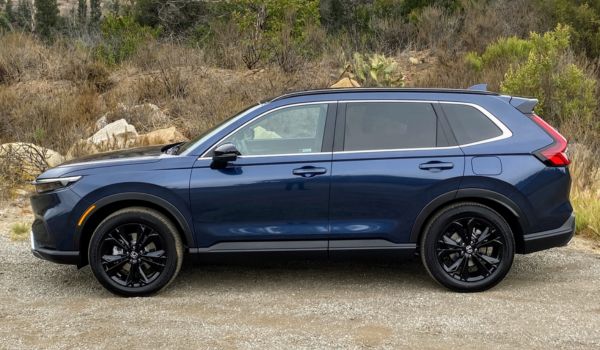
Spacious and Comfortable Interior
One of the main selling points of the CR-V is its roomy, well-designed cabin.
Generous passenger space: Comfortably seats up to five adults, with ample headroom and legroom.
Versatile cargo area: Offers a class-leading cargo volume of 75.8 cubic feet with rear seats folded down, making it perfect for family road trips or weekend adventures.
Excellent Safety Features
Safety is a top priority for Honda, and the CR-V is no exception.
Standard Honda Sensing® suite: Includes advanced driver-assist features like adaptive cruise control, lane-keeping assist, and collision mitigation braking.
Top safety ratings: The CR-V has consistently earned high marks from organizations like the Insurance Institute for Highway Safety (IIHS) and National Highway Traffic Safety Administration (NHTSA).
Competitive Fuel Economy
The Honda CR-V offers impressive fuel efficiency.
Standard CR-V: Achieves up to 28 MPG city and 34 MPG highway.
Hybrid variant: Delivers up to 40 MPG city and 35 MPG highway.
With its spacious interior, enjoyable driving experience, advanced safety features, and competitive fuel economy, the Honda CR-V holds a unique advantage in the compact SUV segment. If these factors align with your priorities, the CR-V could be the perfect choice for you.
The Toyota RAV4 Advantage
As the most popular SUV in America the Toyota RAV4 has been winning the hearts of compact SUV shoppers for years. Let’s take a look at the RAV4s key advantages.
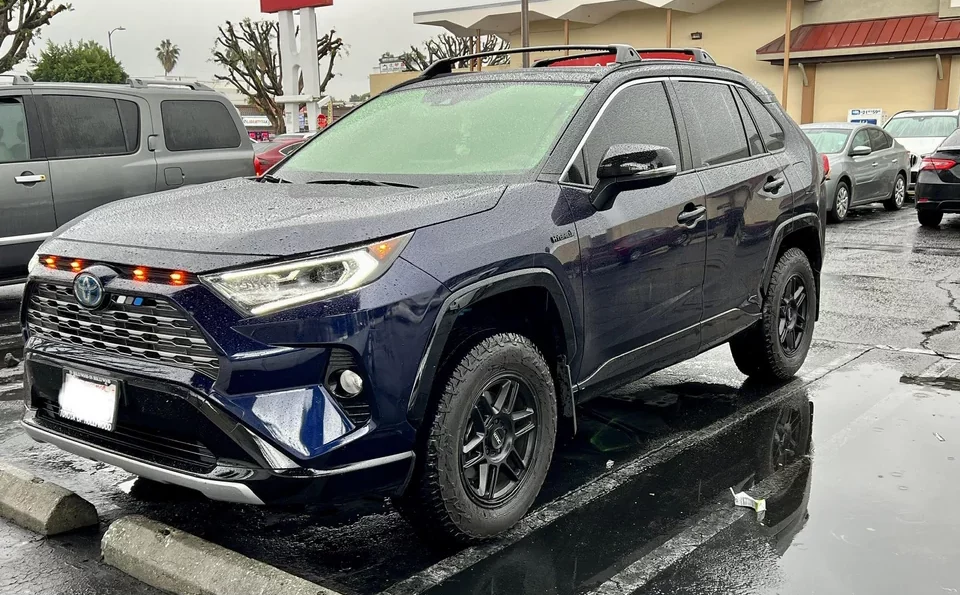
Rugged and Sporty Design
The RAV4 has an eye-catching exterior design that sets it apart from other SUVs.
Bold styling: The RAV4’s aggressive lines and sporty profile make a statement on the road.
Off-road appeal: The RAV4 Adventure and TRD Off-Road trims offer unique features and styling for those seeking a more rugged appearance.
If your interested in expanding its off-road capabilities, see all you need to know about RAV4 lift kits here.
Impressive Performance and Capability
The Toyota RAV4 doesn’t just look the part, it delivers on performance as well.
Dynamic driving experience: The RAV4’s engaging handling and responsive powertrain make it a joy to drive.
Off-road capability: The Adventure and TRD Off-Road trims come with enhanced suspension and off-road features, making the RAV4 more capable on various terrains.
Advanced Safety and Technology
Toyota has equipped the RAV4 with an array of safety and technology features.
Standard Toyota Safety Sense™ 2.0: Includes advanced driver-assist technologies like pre-collision system, lane departure alert, and dynamic radar cruise control.
High safety ratings: The RAV4 consistently receives top safety scores from organizations like IIHS and NHTSA
Diverse Powertrain Options
The RAV4 offers a range of powertrain options to suit different driving needs.
Standard RAV4: Offers up to 27 MPG city and 35 MPG highway.
RAV4 Hybrid: Achieves up to 41 MPG city and 38 MPG highway.
RAV4 Prime: Provides up to 42 miles of all-electric range, perfect for short commutes and city driving.
With its striking design, impressive performance, advanced safety features, and diverse powertrain options, the Toyota RAV4 offers a compelling package for compact SUV buyers. If these factors resonate with your preferences, the RAV4 might just be the perfect fit for you.
Want to know how much cargo space the RAV4 has? See a detailed breakdown of the RAV4 cargo space and dimensions with photos.
Frequently Asked Questions (FAQ)
Both vehicles bring their A-game when it comes to fuel efficiency. The standard Honda CR-V gets up to 28 MPG city and 34 MPG highway and the Toyota RAV4 gets a similar 27 MPG city and 35 MPG highway. For eco-conscious drivers, the Honda CR-V Hybrid offers up to 40 MPG city and 35 MPG highway, and the Toyota RAV4 Hybrid scores up to 41 MPG city and 38 MPG highway.
The Honda CR-V takes the lead with slightly more cargo space, providing a generous 75.8 cubic feet with rear seats folded down. The Toyota RAV4 follows closely with 69.8 cubic feet of cargo space under similar conditions. Rest assured, both SUVs deliver ample room and comfort for up to five passengers.
While both vehicles have experienced recalls and a few reliability issues, these affect only a small number of units. Some CR-V owners reported oil dilution in specific turbocharged engines, while a handful of RAV4 drivers mentioned a malfunctioning backup camera. To play it safe, thoroughly research the model year and variant you have in mind and consult a trusted mechanic before taking the plunge.
Both the Honda CR-V and Toyota RAV4 are equipped with impressive standard safety suites (Honda Sensing® and Toyota Safety Sense™ 2.0). These systems come with nifty features like adaptive cruise control, lane-keeping assist, and pre-collision systems. Plus, both vehicles have consistently scored high marks for safety from organizations like IIHS and NHTSA.


